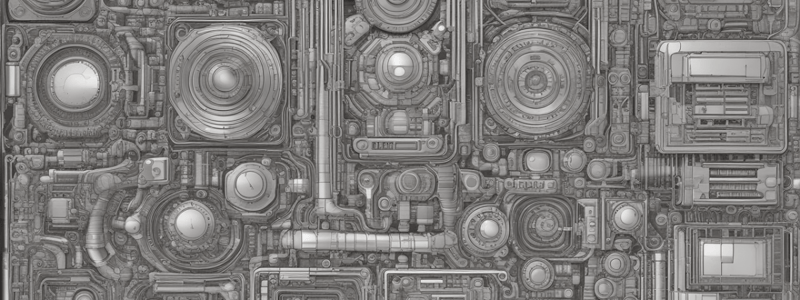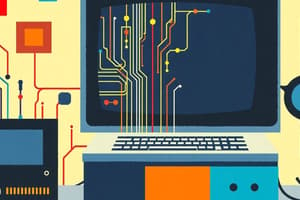Podcast
Questions and Answers
What is the main function of a computer?
What is the main function of a computer?
- To process, store, and display information (correct)
- To perform arithmetic operations
- To store and display information
- To connect to the internet
What was the first all-electronic, general-purpose computer created during?
What was the first all-electronic, general-purpose computer created during?
- World War II (correct)
- The Cold War
- The Industrial Revolution
- The Space Race
What was the invention that played a crucial role in the development of modern computers?
What was the invention that played a crucial role in the development of modern computers?
- The operating system
- The integrated circuit
- The microprocessor
- The transistor (correct)
What was the first commercially available single chip microprocessor?
What was the first commercially available single chip microprocessor?
What is the main difference between digital and analog computers?
What is the main difference between digital and analog computers?
Why did Silicon Valley become synonymous with technological innovation?
Why did Silicon Valley become synonymous with technological innovation?
What technology has transformed how we communicate and share information?
What technology has transformed how we communicate and share information?
Which industry has benefited from the ability of computers to perform tasks like managing complex databases?
Which industry has benefited from the ability of computers to perform tasks like managing complex databases?
What advancement enables computers to mimic human cognition in areas like speech recognition and image classification?
What advancement enables computers to mimic human cognition in areas like speech recognition and image classification?
How do computers assist in predicting disease outbreaks in healthcare?
How do computers assist in predicting disease outbreaks in healthcare?
What are some challenges faced by computers according to the text?
What are some challenges faced by computers according to the text?
What environmental impacts are associated with the production of computer components?
What environmental impacts are associated with the production of computer components?
Study Notes
Computers: A Powerful Tool Changing the World
Introduction
Computers are devices that process, store, and display information. Today, they are an integral part of our lives, touching every aspect of society from healthcare to entertainment and education. This article explores the history, components, and applications of computers, including their advantages and challenges.
History and Components
Computers originated from mechanical calculators used for arithmetic operations. The first all-electronic, general-purpose computer was created during World War II. Since then, significant advancements have led to modern digital computers composed of integrated circuits. There are two main types of computers - digital and analog. Digital computers represent data in binary form (bits), while analog computers use continuous physical magnitudes.
Modern Computers' Structure
Modern digital electronic computers consist of hardware components, operating systems, input/output devices, networking features, and programming languages. The invention of the transistor in 1947 played a crucial role in the development of modern computers.
Silicon Valley and Microprocessors
Silicon Valley became synonymous with technological innovation due to its proximity to Stanford University, where Fairchild Semiconductor was established in 1957, later becoming Intel. Intel's 4004, released in 1972, was the first commercially available single chip microprocessor.
Internet
The internet, a global network of interconnected computers, transformed how we communicate and share information. It enabled the creation of web browsers, search engines, social media platforms, and streaming services, amongst others.
Applications
Computers have numerous applications across industries, including scientific research, healthcare, finance, gaming, education, and entertainment. They perform tasks ranging from small calculations to managing complex databases.
Artificial Intelligence (AI)
Advancements in AI enable computers to mimic human cognition in areas like speech recognition, image classification, and decision-making processes. This has led to groundbreaking innovations, such as self-driving cars, enabling humans to live healthier and safer lives.
Healthcare
In healthcare, computers assist in diagnosing diseases based on patient symptoms, predicting disease outbreaks using big data analytics, and developing new treatments. Additionally, electronic medical records streamline the sharing of patient information between healthcare providers, improving care delivery.
Education
Education has evolved with computers, allowing interactive learning experiences through virtual classrooms and multimedia presentations. AI algorithms can analyze student performance and provide personalized recommendations for improvement.
Challenges
Despite their numerous benefits, computers face challenges related to privacy concerns, security breaches, and environmental impacts.
Privacy and Security
Computer privacy issues arise when sensitive data is shared without consent or adequate protection, leading to potential misuse of personal information. Efforts to address privacy concerns include the development of encryption techniques and strengthening cybersecurity measures.
Environmental Impacts
The production of computer components, particularly microchips, consumes vast amounts of energy and resources, contributing to environmental degradation. Sustainable practices, such as recycling and using renewable energy sources, are necessary to mitigate these impacts.
Conclusion
Computers have revolutionized our lives by enabling advanced technology, reshaping industries, and improving our overall quality of life. While they offer numerous benefits, challenges remain related to privacy, security, and environmental impacts. Continuous research and innovation are crucial to overcome these challenges and ensure a future where computers serve humanity's needs effectively and sustainably.
Studying That Suits You
Use AI to generate personalized quizzes and flashcards to suit your learning preferences.
Description
Test your knowledge on the history, components, and applications of computers. Explore topics such as the evolution of computer technology, modern computer structures, internet development, and the impact of computers on various industries.




